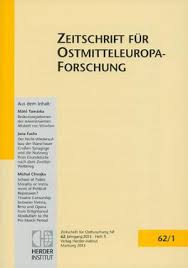Nationalitäten im schlesischen Grenzgebiet. Minderheiten zwischen Polen und der Tschechoslowakei 1945-1948
Nationalities in the Silesian Border Region. Minorities between Poland and Czechoslovakia, 1945-1948
Author(s): Andreas R. HofmannSubject(s): Nationalism Studies, WW II and following years (1940 - 1949), Inter-Ethnic Relations, Ethnic Minorities Studies, Peace and Conflict Studies
Published by: Verlag Herder-Institut
Keywords: Nationalities; Silesian Border Region; Minorities; Poland and Czechoslovakia; 1945-1948;
Summary/Abstract: Immediately after World War II Czechoslovakia laid claim to southern territories in Lower Silesia which had previously belonged to the German Reich (the districts of Klodzko, Glubczyce, and Racibórz). Much to the bewilderment of the newly established Polish administration, the Czechoslovaks dispatched armed units and Soviet local Commanders had to intervene to prevent an escalation of the conflict. Though after the Potsdam Conference the Czechoslovak Claims ceased to be a viable Option in international politics, the Czechoslovak government continued to put pressure upon the Poles, who in turn sought to acquire the Czech part of the Tesi'n Territory. Both governments were committed to acquiring territories inhabited by their respective co-national minorities who figured in a diplomatic game that went on until the Soviets pressed the two sides to conclude a treaty in March 1947. Only after that date was a Polish-Czech commission organised to verify the nationality of Czechs who lived on the Polish side of the Silesian border in order to prevent them from being expelled on grounds of their German citizenship. Policies towards Lusatian Sorbs in the Soviet Zone of Occupation, and toward the ethnic minorities of Sorbs and Moravians who lived along the Polish-Czech border, were also exploited in the Czech-Polish conflict. Yet with the unfolding of the Cold War, Czech-Polish discord became a liability to Soviet foreign policy interests, and their disputes receded in the face of new political priorities as both countries were ever more tightly incorporated into the Soviet sphere of influence.
Journal: Zeitschrift für Ostmitteleuropa-Forschung
- Issue Year: 56/2007
- Issue No: 1
- Page Range: 68-90
- Page Count: 23
- Language: German

